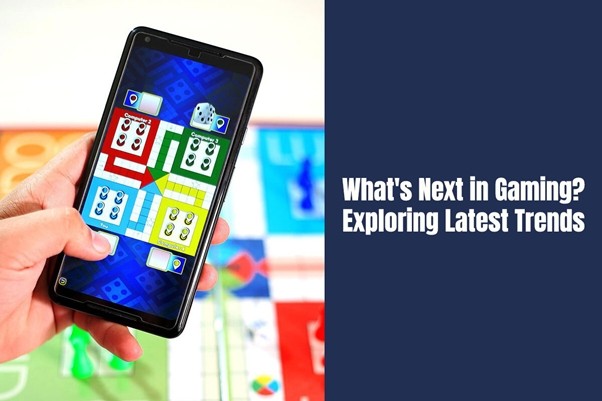What's Next in Gaming? Exploring Latest Trends

Technological innovation has always been the focus of the gaming industry. This industry is pushing the boundaries of what’s possible in entertainment, interactivity, and immersion, fueled by evolving consumer expectations and technological advancements. The future of gaming looks more exciting than ever, and if you thought being able to play Ludo online was the most exciting innovation in the gaming industry, hold on to the edge of your seat because there’s so much more coming your way. Here’s a lowdown of what you can expect next.
Cloud gaming - No more hardware barriers to gaming!
One of the most talked-about trends in gaming is cloud gaming. This technology lets players stream games directly from remote servers, eliminating the need for powerful local hardware. Services like Google Stadia, Microsoft’s Xbox Cloud Gaming (xCloud), and NVIDIA’s GeForce Now are leading the charge, offering a seamless experience that enables gamers to play high-end titles on devices as basic as smartphones or laptops.
Cloud gaming democratizes access to high-quality gaming experiences, allowing users to enjoy AAA titles without needing expensive gaming rigs or consoles. It opens up a much larger developer audience since players no longer need to worry about hardware compatibility.
Challenges: The biggest challenge remains Internet connectivity. Cloud gaming needs a fast and consistent Internet connection, and the lag (latency) can detract from the gaming experience, especially in competitive genres. However, with the growing rollout of 5G networks, these challenges are being addressed, bringing us closer to a future where cloud gaming becomes mainstream. Also, 6G technology is being prepped for rolling out soon.
VR and AR - Immersive gaming experiences at your fingertips!
While VR has been in the gaming world for a while, it’s poised for even greater growth as the technology becomes more refined. Devices like the Meta Quest 3 and Sony PlayStation VR2 make virtual reality more accessible. In parallel, AR gaming is gaining traction, with titles like Pokémon Go continuing to evolve and companies exploring new ways to integrate AR into everyday experiences.
VR and AR are pushing gaming into the realm of total immersion. In VR, players can lose themselves in entirely digital worlds, interacting with environments and characters in previously impossible ways. AR, on the other hand, blends digital experiences with the physical world, enhancing reality with game elements.
Challenges: The cost of VR headsets and the physical space required for full VR immersion are still barriers to widespread adoption. Additionally, motion sickness is a common issue for many users in VR environments. Despite these challenges, its growth potential is undeniable as the technology becomes more user-friendly and affordable.
Metaverse and social gaming - Interaction like never before!
The metaverse concept is rapidly evolving, with companies like Meta (formerly Facebook) and Epic Games making significant investments in building virtual worlds where players can socialize, work, and play. Gaming is at the heart of these virtual universes, with platforms like Roblox, Fortnite, and Minecraft already creating immersive spaces where players can interact beyond traditional gameplay.
The metaverse represents the next stage of social gaming. It’s not just about playing games but about building communities, attending virtual concerts, and engaging in commerce. Integrating virtual economies and NFTs (non-fungible tokens) allows players to own digital assets that hold real-world value.
Challenges: The success of the metaverse depends heavily on the adoption of blockchain technology and virtual economies. There’s also concern over the ethical implications of immersive environments, including data privacy, the blurring of reality, and potential addiction.
AI-powered game development - Quick game creation and player experience pushed to the next level!
AI has long been used in gaming to improve non-player character (NPC) behavior and game world mechanics. However, the next generation of AI tools is set to revolutionize game development and player interaction.
AI can help developers automate complex tasks, such as generating vast open worlds, realistic NPC behaviors, and responsive narratives. AI-driven content can provide players with a more personalized experience, adapting gameplay difficulty, story arcs, and even in-game interactions to suit individual playstyles. AI also promises to improve anti-cheating mechanisms and ensure fair play in online multiplayer games.
Challenges: While AI promises to streamline development and enhance gameplay, there’s concern about its overreliance. Automated processes may reduce the need for human developers in certain areas, potentially leading to job displacement. Additionally, AI-driven systems sometimes lack the human touch that makes gaming experiences feel unique and tailored.
eSports - Making its way from niche to mainstream
eSports has become a global phenomenon, with professional leagues, massive prize pools, and dedicated fanbases. Games like League of Legends and Counter-Strike: Global Offensive have catapulted esports into the mainstream, and this trend does not show signs of slowing down. Even games like Rummy, Poker, and Spades are capitalizing on the eSports trend and creating a competitive gaming area for players.
eSports allows gamers to compete professionally, turning what was once a hobby into a lucrative career. With brands and sponsors heavily investing in esports, it’s becoming a cornerstone of the gaming ecosystem.
Challenges: eSports' rapid growth brings challenges, including concerns about players' mental health, the grueling demands of professional gaming, and the industry’s sustainability as it scales. Additionally, regulation and governance within esports leagues are still in their infancy, leading to issues around fairness and ethics.
Conclusion
The gaming industry is evolving rapidly, and the trends discussed here represent only a glimpse of the future. As technology advances, the lines between reality and gaming will blur even further, offering unprecedented immersion, interactivity, and social engagement.
Add new comment
- 86 views
